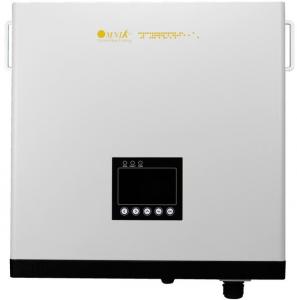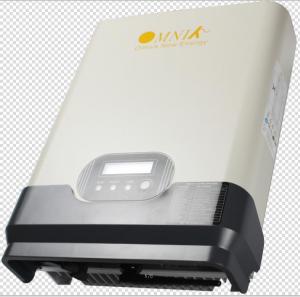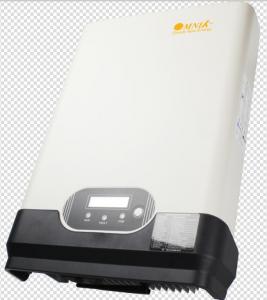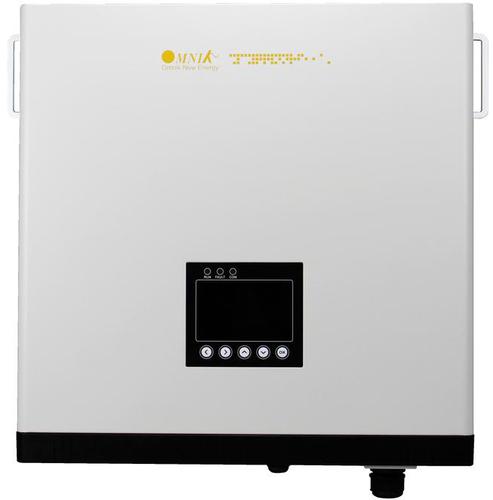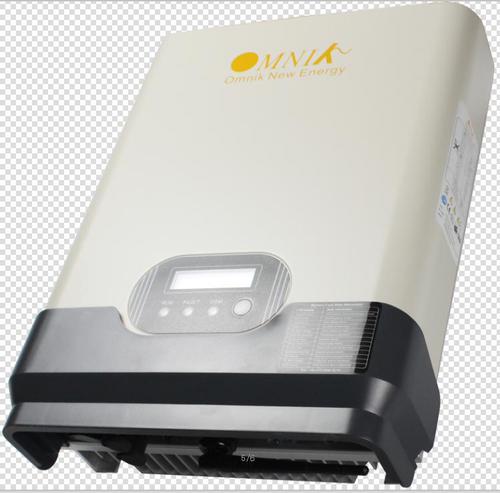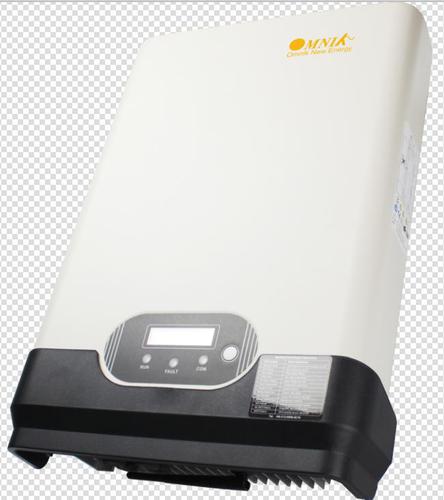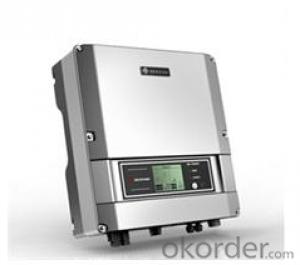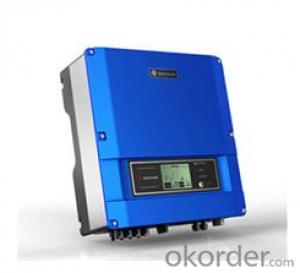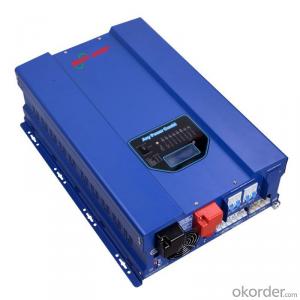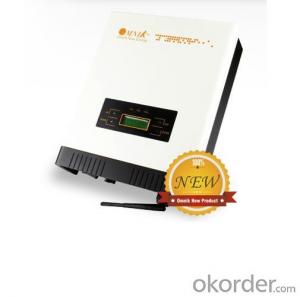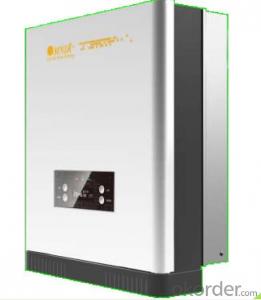Livguard Solar Inverter Omniksol-1.5k-TL
- Loading Port:
- Shanghai
- Payment Terms:
- TT OR LC
- Min Order Qty:
- -
- Supply Capability:
- 3000 pc/month
OKorder Service Pledge
OKorder Financial Service
You Might Also Like
Omnik new energy solar inverter
Omniksol-2.0k-TL Photon Efficiency up to 3kW
in the world------ Photon tested Jan. 2012.
Omniksol-1.5k-TL
Futures
Transformerless design, high efficiency (Max.97.5%,Euro.96.6%)
High MPPT accuracy(>99.9%)
Wide DC input range(120-500 Vdc), compatible with different module technologies
Easy to wire, install and operate
IP 65 design, suitable for indoor and outdoor installation
5 years warranty(10~25 years as option)
technical data:
Type | Omniksol-1.0k-TL | Omniksol-1.5k-TL | Omniksol-2.0k-TL |
Max. PV-Generator Power [W] | 1300 | 1750 | 2300 |
Max. DC voltage [V] | 500 | 500 | 500 |
MPPT DC voltage Range [V] | 80-300 | 120 - 450 | 120 - 450 |
Turn off DC voltage [V] | 80 | 120 | 120 |
Max. DC Current [A] | 16 | 18 | 18 |
Nominal DC Current [A] | 8.5 | 14 | 16 |
Number of DC Connection | 1 | 1 | 1 |
DC-Connection | MC4 | MC4 | MC4 |
Number of MPP trackers Turn on Power [W] | 1 | 1 | 1 |
Turn on power(W) | 10 | 10 | 10 |
- Q: How do you calculate the maximum power point current for a solar inverter?
- To calculate the maximum power point current for a solar inverter, you need to determine the maximum power point voltage (Vmpp) of the solar panel and divide it by the inverter's input impedance. This can be done by using the voltage-current (V-I) curve of the solar panel and locating the point where the product of voltage and current is maximized. By obtaining the Vmpp value, you can then calculate the maximum power point current by dividing it by the inverter's input impedance.
- Q: How does a solar inverter handle variations in solar irradiation?
- A solar inverter handles variations in solar irradiation by continuously monitoring the amount of sunlight received from the solar panels. It adjusts its power output accordingly to convert the maximum available DC power from the panels into AC power for use in the electrical grid or home. This dynamic response ensures that the inverter optimizes energy production even during changing weather conditions or fluctuations in solar irradiation.
- Q: Can a solar inverter convert DC power to AC power?
- Yes, a solar inverter can convert DC power generated by solar panels into AC power that is suitable for use in homes and businesses.
- Q: What are the signs of a faulty solar inverter?
- Some signs of a faulty solar inverter include a complete loss of power generation, inconsistent or fluctuating power output, error messages or fault codes displayed on the inverter, unusual noises or excessive heat coming from the inverter, and a lack of communication or connection with monitoring systems.
- Q: How does a solar inverter handle voltage and frequency variations caused by load shedding?
- A solar inverter handles voltage and frequency variations caused by load shedding by constantly monitoring the grid conditions. When it detects a drop in voltage or frequency, it adjusts its output parameters accordingly to maintain a stable supply of electricity to the connected loads. This ensures that the devices receiving power from the solar inverter are not affected by the fluctuations in the grid caused by load shedding.
- Q: Can a solar inverter be used in three-phase systems?
- Yes, a solar inverter can be used in three-phase systems. Three-phase systems are commonly used in industrial and commercial applications, and solar inverters are available in both single-phase and three-phase configurations to accommodate these systems. The three-phase solar inverter converts the direct current (DC) generated by the solar panels into alternating current (AC) that is compatible with the three-phase power grid.
- Q: What is the role of a maximum power point tracker (MPPT) in a solar inverter?
- In a solar inverter, the maximum power point tracker (MPPT) plays a crucial role in optimizing the efficiency and power output of the solar panel system. Since solar panels generate direct current (DC) electricity while most appliances and the electrical grid operate on alternating current (AC), the MPPT continuously adjusts the operating conditions of the solar panels to extract the maximum power available from sunlight. The MPPT tracks the maximum power point (MPP) at which the solar panels can efficiently generate the most electricity. This is vital because the output of a solar panel depends significantly on factors like temperature, shading, and the angle of the sun. To ensure maximum power output, the MPPT continuously monitors and adjusts the voltage and current of the solar panel system, keeping it at the MPP. It achieves this by dynamically altering the electrical load on the solar panels to find the optimal operating point. Additionally, the MPPT acts as a converter, transforming the DC power generated by the solar panels into the AC power required for appliances or for feeding back into the electrical grid. This conversion process involves adjusting the voltage and frequency of the electricity to match the requirements of the appliances or the grid. In summary, the primary function of a maximum power point tracker in a solar inverter is to optimize the efficiency and power output of the solar panel system, ensuring the extraction of the maximum amount of energy from sunlight and its effective utilization for various applications.
- Q: Can a solar inverter be used in commercial applications?
- Yes, a solar inverter can be used in commercial applications. Commercial buildings can install solar panels and connect them to a solar inverter, which converts the DC power generated by the panels into usable AC power for the building's electrical system. This allows commercial establishments to harness solar energy and reduce their reliance on traditional grid power sources, resulting in cost savings and environmental benefits.
- Q: What is the role of a solar inverter in preventing underperformance?
- The role of a solar inverter in preventing underperformance is to convert the direct current (DC) electricity produced by the solar panels into alternating current (AC) electricity that can be used to power household appliances and be fed into the grid. The inverter also monitors the performance of the solar system, ensuring that it operates at maximum efficiency and identifying any issues or underperformance. By constantly optimizing the energy production and detecting any problems, the solar inverter plays a crucial role in preventing underperformance and maximizing the overall output of the solar power system.
- Q: What is the difference between a string inverter and a microinverter?
- The main difference between a string inverter and a microinverter lies in the way they convert direct current (DC) from solar panels to alternating current (AC) for use in homes or businesses. A string inverter is a centralized device that connects multiple solar panels in a series or "string" configuration. It converts the combined DC power from the entire string into AC power. This means that if one panel in the string underperforms or is shaded, it can affect the overall performance of the entire string. On the other hand, a microinverter is a small inverter that is attached to each individual solar panel. It converts the DC power from each panel into AC power independently. This allows each panel to perform optimally, even if others in the system are shaded or experiencing issues. In summary, while a string inverter handles the conversion of power from multiple panels as a whole, a microinverter ensures each panel operates at its maximum potential independently.
Send your message to us
Livguard Solar Inverter Omniksol-1.5k-TL
- Loading Port:
- Shanghai
- Payment Terms:
- TT OR LC
- Min Order Qty:
- -
- Supply Capability:
- 3000 pc/month
OKorder Service Pledge
OKorder Financial Service
Similar products
Hot products
Hot Searches
Related keywords
